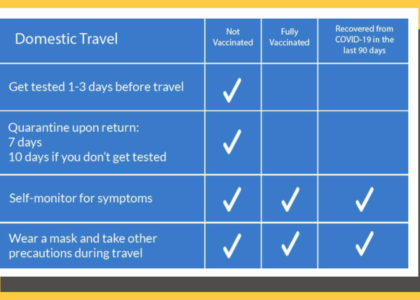The Importance of Following CDC International Travel Guidelines
Traveling internationally can be an exciting and enriching experience, but it also comes with certain risks, especially in the context of global health concerns. The Centers for Disease Control and Prevention (CDC) plays a crucial role in providing guidelines and recommendations to help travelers stay safe and healthy during their journeys.
Key Points to Consider Before Traveling Abroad:
- Vaccinations: Check with the CDC website to see if there are any recommended or required vaccinations for your destination.
- Health Alerts: Stay informed about any health alerts or outbreaks in the region you plan to visit.
- Safety Precautions: Follow safety guidelines such as wearing masks, practicing good hand hygiene, and maintaining physical distance when necessary.
- Medical Insurance: Make sure you have adequate medical insurance coverage that includes international travel.
Why CDC Guidelines Matter:
The CDC’s international travel guidelines are based on thorough research and expert advice to help protect travelers from potential health risks. By following these guidelines, you not only safeguard your own health but also contribute to global efforts in preventing the spread of diseases across borders.
Staying Informed and Prepared:
Before embarking on your international journey, take the time to familiarize yourself with the latest CDC recommendations for your destination. Be proactive in taking necessary precautions and stay informed about any updates or changes that may affect your travel plans.
Remember, your health and well-being are paramount when traveling abroad. By following the CDC’s international travel guidelines diligently, you can enjoy a safe and memorable experience wherever your adventures take you.
Essential FAQs for Safe and Healthy International Travel: Vaccinations, Health Alerts, Insurance, and More
- What vaccinations are recommended or required for international travel?
- How can I stay informed about health alerts and outbreaks in my destination country?
- What safety precautions should I take while traveling internationally?
- Does my medical insurance cover international travel?
- Are there specific health risks I should be aware of when traveling to certain regions?
- What should I do if I get sick while traveling abroad?
- How can I find a healthcare provider or clinic in a foreign country?
- What steps should I take to prevent the spread of diseases during my international travels?
What vaccinations are recommended or required for international travel?
When planning for international travel, it is essential to be aware of the vaccinations recommended or required for your destination. The Centers for Disease Control and Prevention (CDC) provides valuable guidance on this matter, helping travelers stay informed and protected against potential health risks. By checking the CDC’s website or consulting with a healthcare provider, you can determine which vaccinations are necessary based on the specific location you plan to visit. Ensuring that you are up-to-date on recommended vaccines not only safeguards your own health but also contributes to global efforts in preventing the spread of infectious diseases across borders.
How can I stay informed about health alerts and outbreaks in my destination country?
To stay informed about health alerts and outbreaks in your destination country, it is recommended to regularly check the Centers for Disease Control and Prevention (CDC) website for updated information. The CDC provides valuable resources, including country-specific health notices and travel recommendations, to help travelers stay informed about potential health risks. Additionally, signing up for travel alerts and notifications from reputable sources can ensure that you receive timely updates on any emerging health concerns in your destination. Being proactive in monitoring health advisories can help you make informed decisions and take necessary precautions to protect your well-being while traveling internationally.
What safety precautions should I take while traveling internationally?
When traveling internationally, it is essential to prioritize your health and safety by taking certain precautions. The Centers for Disease Control and Prevention (CDC) recommends several safety measures to protect yourself during your travels. These include wearing masks in crowded or enclosed spaces, practicing good hand hygiene by washing hands frequently or using hand sanitizer, maintaining physical distance from others when possible, and staying informed about any health alerts or outbreaks in the region you are visiting. By following these guidelines and staying vigilant, you can help reduce the risk of exposure to potential health hazards while abroad.
Does my medical insurance cover international travel?
When planning for international travel, a common concern many travelers have is whether their medical insurance provides coverage abroad. It is essential to check with your insurance provider to understand the extent of coverage for international travel. Some insurance policies may offer limited or no coverage for medical expenses incurred overseas, while others may include provisions for emergency medical care or evacuation. It is advisable to review your policy details, consider purchasing additional travel insurance if needed, and ensure you have adequate coverage to address any unforeseen health-related issues during your trip.
Are there specific health risks I should be aware of when traveling to certain regions?
When planning international travel to specific regions, it is essential to be aware of the potential health risks associated with those areas. The Centers for Disease Control and Prevention (CDC) provides valuable information on region-specific health risks, including prevalent diseases, required vaccinations, and recommended precautions. By staying informed about these health risks and taking necessary preventive measures, travelers can better protect themselves and ensure a safe and healthy journey. It is advisable to consult the CDC guidelines for each destination to understand the specific health considerations and make informed decisions before embarking on your travels.
What should I do if I get sick while traveling abroad?
If you get sick while traveling abroad, it is essential to take prompt action to ensure your well-being and receive the necessary medical care. The Centers for Disease Control and Prevention (CDC) recommends that you contact a healthcare provider in the area where you are staying for assistance. Be sure to have travel insurance that covers medical emergencies and keep important documents, such as your insurance information and emergency contacts, easily accessible. It is also advisable to follow any local health protocols and guidelines to prevent the spread of illness to others. Prioritize your health and safety by seeking appropriate medical attention if needed while abroad.
How can I find a healthcare provider or clinic in a foreign country?
When traveling abroad, finding a healthcare provider or clinic in a foreign country is essential for addressing any medical needs that may arise during your trip. The Centers for Disease Control and Prevention (CDC) recommends several methods to locate reliable healthcare services while traveling internationally. One option is to contact the nearest U.S. embassy or consulate for assistance in identifying reputable healthcare providers in the area. Additionally, seeking recommendations from local residents, hotel staff, or other travelers can help you find trusted clinics or hospitals that provide quality care. It’s also advisable to carry travel insurance that covers medical expenses and provides information on approved healthcare facilities in your destination country. Being prepared and proactive in finding a healthcare provider ensures that you can access necessary medical care promptly and efficiently while abroad.
What steps should I take to prevent the spread of diseases during my international travels?
When it comes to preventing the spread of diseases during international travels, there are several important steps you can take to protect yourself and others. First and foremost, following the Centers for Disease Control and Prevention (CDC) guidelines is crucial. This includes staying up-to-date on recommended vaccinations, practicing good hygiene by washing hands frequently, wearing masks in crowded or enclosed spaces, and maintaining physical distance when possible. Additionally, being aware of any health alerts or outbreaks in your destination and seeking medical attention if you develop any symptoms are essential precautions to take while traveling internationally. By being proactive and responsible in your approach to health and safety measures, you can help minimize the risk of spreading diseases during your travels.




